Group puzzles naturally ease anxiety by fostering social connections and support. As you engage in collaborative problem-solving, you're drawn into the present moment, distracting your mind from worries. The shared accomplishment of completing a puzzle boosts your self-esteem and confidence. You'll experience a sense of control and order as you work together to create something cohesive from chaos. The activity promotes endorphin release through shared enjoyment and laughter, reducing stress levels. By participating in group puzzles, you're not only having fun but also developing valuable skills that can help you manage anxiety in various aspects of life. Discover more benefits as you explore this engaging activity.
Social Connection and Support

One of the key benefits of engaging in group puzzles is the social connection and support they foster. When you participate in puzzle-solving activities with others, you're not just working on a task; you're building relationships and creating a sense of community. This social interaction can greatly reduce feelings of isolation and loneliness, which are often associated with anxiety.
As you collaborate with your group to solve puzzles, you'll find yourself communicating, sharing ideas, and supporting one another. This process naturally encourages positive social behaviors and can help you feel more connected to those around you. You'll likely experience a boost in mood and self-esteem as you contribute to the group's success.
Moreover, the shared experience of overcoming challenges together can create a strong bond among participants. You'll develop a sense of belonging and mutual understanding, which can serve as a buffer against anxiety-inducing situations in other areas of your life.
The supportive environment fostered by group puzzle-solving can provide a safe space to practice social skills and build confidence, ultimately helping you manage anxiety more effectively in various social settings.
Mindful Focus on Present Moment
When you engage in group puzzles, you're naturally drawn into the present moment, offering a welcome distraction from anxious thoughts.
The tactile experience of handling puzzle pieces, combined with the visual challenge, creates an immersive sensory experience that anchors you in the here and now.
As you and your fellow puzzlers collectively focus on the task at hand, you're practicing shared mindfulness, reinforcing the power of group attention.
Distraction From Worries
While anxiety often thrives on rumination about past or future events, group puzzles offer a powerful antidote by demanding your full attention in the present moment. As you engage with the puzzle pieces and collaborate with others, your mind naturally shifts away from worrisome thoughts.
The complex nature of puzzles requires concentration, leaving little room for your brain to dwell on anxious feelings. You'll find yourself absorbed in the task at hand, whether it's searching for a specific piece or discussing strategies with your group. This mental engagement acts as a form of cognitive distraction, temporarily relieving you from the weight of your concerns.
Moreover, the social aspect of group puzzles adds another layer of distraction. Interacting with others, sharing discoveries, and celebrating small victories together create a positive atmosphere that further diverts your attention from anxiety-inducing thoughts.
You're likely to find yourself caught up in friendly banter or collaborative problem-solving, which can be incredibly effective in breaking the cycle of worry.
Immersive Sensory Experience
Group puzzles offer a rich, immersive sensory experience that naturally promotes mindfulness. As you engage with the puzzle pieces, your senses become heightened, drawing your attention to the present moment. You'll feel the texture of the pieces in your fingers, see the vibrant colors and intricate patterns, and hear the satisfying click as pieces fit together. This sensory engagement helps anchor you in the here and now, effectively reducing anxiety by shifting your focus away from worries about the past or future.
The immersive nature of group puzzles creates a state of flow, where you're fully absorbed in the task at hand. This state of focused concentration can be incredibly calming and therapeutic.
You'll find yourself naturally practicing mindfulness as you:
- Carefully examine each piece's shape and color
- Listen attentively to your teammates' suggestions
- Coordinate your movements with others to place pieces
Collective Attention Practice
Engaging in group puzzles fosters a powerful collective attention practice, drawing participants into a shared mindful focus on the present moment. As you work together on a puzzle, you'll find your mind naturally shifting away from worries and anxieties, centering instead on the task at hand. This collective focus creates a sense of shared purpose, anchoring everyone in the here and now.
You'll notice how the puzzle pieces demand your full attention, leaving little room for intrusive thoughts. As you collaborate with others, you're practicing active listening and clear communication, further enhancing your present-moment awareness.
The act of searching for patterns, colors, and shapes trains your brain to observe details mindfully, a skill that can extend beyond puzzle-solving into daily life.
This shared experience of concentrated focus can be particularly beneficial for those struggling with anxiety. It provides a natural, non-threatening way to practice mindfulness in a supportive group setting.
You're not just solving a puzzle; you're cultivating a valuable skill that can help manage anxiety and promote overall mental well-being.
Shared Accomplishment and Success
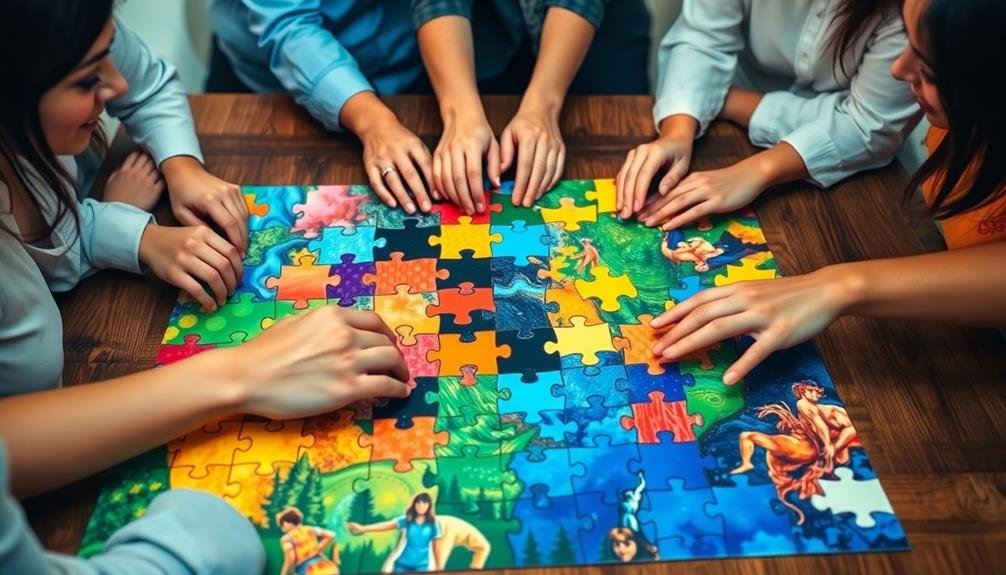
When you solve puzzles as a group, you're not just completing a task—you're building collective confidence.
Your shared success boosts the team's self-esteem, creating a sense of accomplishment that extends beyond the puzzle itself.
This positive experience fosters a stronger team spirit and enhances your group's ability to tackle future challenges together.
Boosting Collective Self-Esteem
Puzzle-solving's collaborative nature provides an excellent opportunity to boost collective self-esteem. When you work together on a puzzle, you're not just solving a challenge; you're building confidence as a group. Each piece placed correctly is a small victory that contributes to the overall sense of accomplishment. This shared success reinforces the idea that you're capable of overcoming obstacles together, which can greatly reduce anxiety levels.
As you progress through the puzzle, you'll notice your team's confidence growing. This boost in collective self-esteem can have lasting effects beyond the puzzle-solving session.
Here are three ways group puzzles enhance collective self-esteem:
- Celebrating small wins together
- Recognizing individual contributions to the group's success
- Building trust and reliance on each other's strengths
The sense of achievement you experience upon completing a group puzzle can carry over into other aspects of your life. It reinforces the belief that you can tackle challenges effectively as a team, whether in personal relationships or professional settings.
This increased confidence can help mitigate anxiety in future group situations, making collaborative puzzle-solving a valuable tool for personal and collective growth.
Fostering Team Confidence
The act of completing a puzzle as a team fosters a unique sense of shared accomplishment. As you work together to solve complex problems, you'll find your collective confidence growing. Each piece you fit into place becomes a small victory, building momentum and boosting morale.
When you collaborate on a puzzle, you're not just solving a visual challenge; you're developing essential team skills. You'll learn to communicate effectively, delegate tasks, and leverage each member's strengths. This process naturally enhances your group's problem-solving abilities and promotes a positive team dynamic.
| Emotion | Individual Puzzling | Group Puzzling |
|---|---|---|
| Confidence | Moderate | High |
| Belongingness | Low | High |
| Satisfaction | Moderate | Very High |
| Stress | Moderate | Low |
| Excitement | Moderate | High |
As you experience success together, you'll notice a shift in your team's attitude. The shared triumph of completing a challenging puzzle can spark a sense of unity and pride that extends beyond the activity itself. This newfound confidence can translate into improved performance in other areas of work or life, making group puzzling a powerful tool for fostering team confidence and cohesion.
Cognitive Distraction From Worries
Group puzzles offer a powerful cognitive distraction from worries and anxious thoughts. When you're engrossed in solving a puzzle with others, your mind shifts focus from personal concerns to the task at hand. This redirection of mental energy can provide temporary relief from anxiety and create a much-needed break from rumination.
The cognitive demands of puzzle-solving engage multiple areas of your brain, leaving less room for anxious thoughts to take hold. You'll find yourself concentrating on patterns, strategies, and collaborative problem-solving, which can effectively crowd out worry-inducing thoughts. This mental shift isn't just a momentary distraction; it can help rewire your thought patterns and provide a new perspective on your concerns.
Group puzzles offer several cognitive benefits that contribute to anxiety reduction:
- Increased mental engagement and focus
- Improved problem-solving skills and critical thinking
- Enhanced ability to shift attention away from negative thoughts
Stress-Free Collaboration and Teamwork

Diving into group puzzles fosters a unique environment for stress-free collaboration and teamwork. When you're working on a puzzle with others, you're united by a common goal that doesn't carry the weight of real-world consequences. This low-stakes setting allows you to practice teamwork without the anxiety often associated with group projects or work collaborations.
As you piece together the puzzle, you'll naturally fall into roles that suit your strengths. Some might focus on edge pieces, while others sort by color or pattern. This organic division of tasks mimics effective teamwork without the pressure of assigned roles. You'll learn to communicate ideas, share discoveries, and celebrate small victories together.
Group puzzling also encourages a supportive atmosphere. When you're stuck, teammates can offer fresh perspectives or lend a hand. This reciprocal help builds trust and camaraderie, skills that translate to other areas of life.
The shared experience of completing a puzzle creates a sense of collective achievement, boosting morale and confidence in your ability to work together effectively.
Boost in Self-Esteem
Completing a group puzzle can markedly boost your self-esteem. As you work together to solve the puzzle, you'll experience a sense of accomplishment that reinforces your belief in your abilities. This collaborative achievement can have a lasting impact on how you perceive yourself and your capabilities.
When you contribute to the puzzle-solving process, you're actively demonstrating your problem-solving skills and creativity. You'll notice that your input is valued by your teammates, which can notably enhance your self-worth. As the puzzle takes shape, you'll feel a growing sense of pride in your collective effort.
Here are three ways group puzzles boost self-esteem:
- Provide tangible evidence of your problem-solving abilities
- Offer opportunities to showcase your unique strengths
- Create a shared sense of achievement with peers
The boost in self-esteem you gain from group puzzles can extend beyond the activity itself. You'll likely find yourself more confident in approaching other challenges in your daily life.
This newfound self-assurance can help you tackle anxiety-inducing situations with greater ease, as you'll have concrete evidence of your ability to overcome obstacles as part of a team.
Sense of Control and Order

While self-esteem is a significant benefit, group puzzles also offer a powerful sense of control and order. When you're working on a puzzle with others, you're engaging in a structured activity with clear rules and objectives. This predictability can be incredibly soothing for those dealing with anxiety.
As you sort pieces, identify patterns, and gradually build the image, you're creating order out of chaos. This process mirrors how you might approach real-life problems, giving you a tangible example of how breaking down complex issues into manageable parts can lead to solutions. The act of fitting pieces together provides immediate feedback and small victories, reinforcing your ability to make progress and effect change.
Moreover, group puzzles allow you to exert control over your environment in a low-stakes setting. You decide which section to work on, how to approach the puzzle, and when to take breaks.
This sense of agency can be particularly empowering for those who feel overwhelmed by life's uncertainties. By mastering the puzzle-solving process, you're practicing skills that can help you feel more in control of other aspects of your life.
Endorphin Release Through Fun
One of the most immediate benefits of group puzzles is the release of endorphins through shared fun. When you engage in enjoyable activities with others, your brain produces these natural feel-good chemicals, helping to reduce stress and anxiety.
Group puzzles provide a perfect opportunity for this endorphin boost, as you collaborate, laugh, and celebrate small victories together.
The fun aspect of group puzzles isn't just about the activity itself; it's about the social interaction and shared experience. You'll find yourself smiling, joking, and experiencing a sense of camaraderie with your fellow puzzle-solvers.
This positive social engagement further enhances the endorphin release, creating a cycle of enjoyment and relaxation.
Here are three ways group puzzles promote endorphin release through fun:
- Shared laughter and jokes during the puzzle-solving process
- Celebrating small victories when pieces fit or sections are completed
- Friendly competition and playful banter among participants
Frequently Asked Questions
Are Group Puzzles Effective for All Types of Anxiety Disorders?
While group puzzles can be beneficial, they're not a one-size-fits-all solution for anxiety disorders. You'll find they're most effective for social anxiety, but may not address specific phobias or more severe conditions like PTSD or OCD.
How Often Should One Participate in Group Puzzles for Optimal Benefits?
You'll benefit most by participating in group puzzles 2-3 times a week. However, your ideal frequency may vary. Start with once a week and gradually increase. Pay attention to how you feel and adjust accordingly.
Can Virtual Group Puzzle-Solving Provide Similar Anxiety-Reducing Effects as In-Person Sessions?
You'll find virtual group puzzle-solving can offer similar anxiety-reducing benefits to in-person sessions. While you might miss some face-to-face interaction, you'll still enjoy collaborative problem-solving, social connection, and mental distraction through online platforms.
Are There Specific Types of Puzzles That Work Best for Anxiety Relief?
You'll find jigsaw puzzles, crosswords, and Sudoku particularly effective for anxiety relief. They require focus, stimulate problem-solving skills, and provide a sense of accomplishment. Choose puzzles that challenge you without being frustratingly difficult for the best results.
How Long Does the Anxiety-Reducing Effect of Group Puzzles Typically Last?
You'll typically experience anxiety relief for a few hours after completing group puzzles. The effect's duration can vary based on your stress levels and the puzzle's complexity. Regular puzzle sessions may lead to longer-lasting benefits over time.
In Summary
You've discovered a fun and effective way to manage anxiety naturally. By engaging in group puzzles, you're not just solving a challenge—you're building connections, staying present, and boosting your mood. You're giving your mind a break from worries while fostering teamwork and self-esteem. Remember, every piece you place is a step towards feeling more in control and less stressed. So gather some friends, pick a puzzle, and let the healing begin!

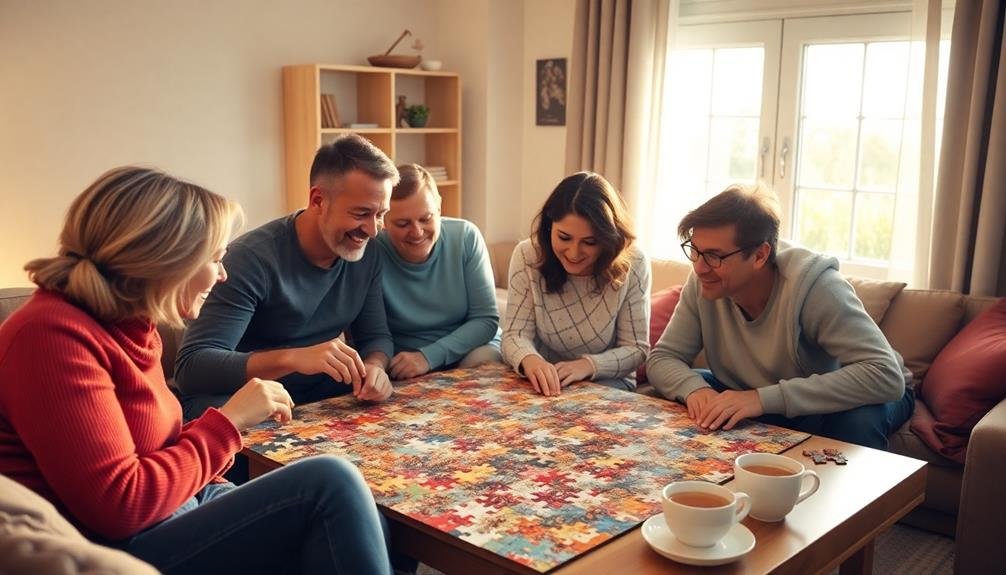
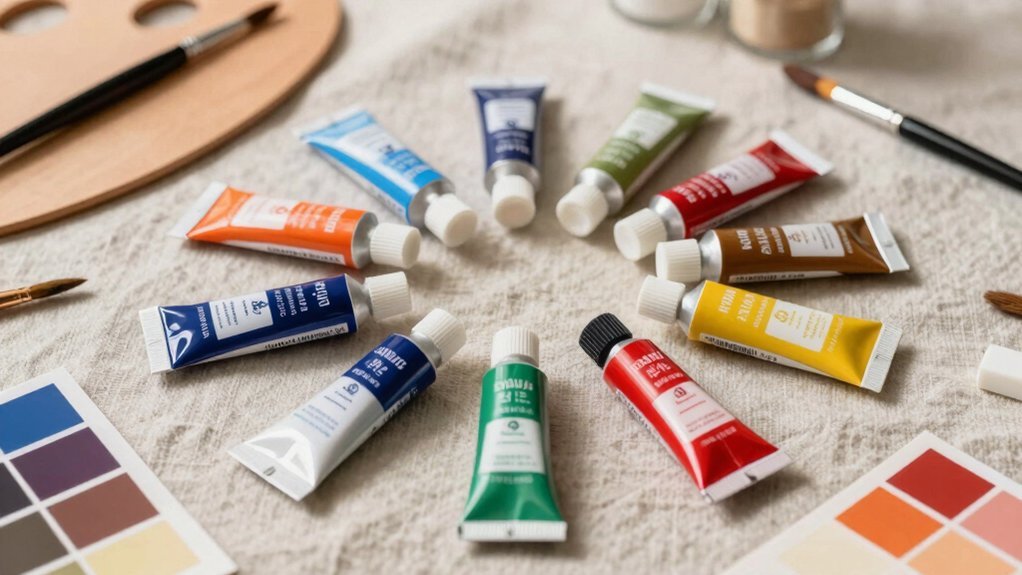
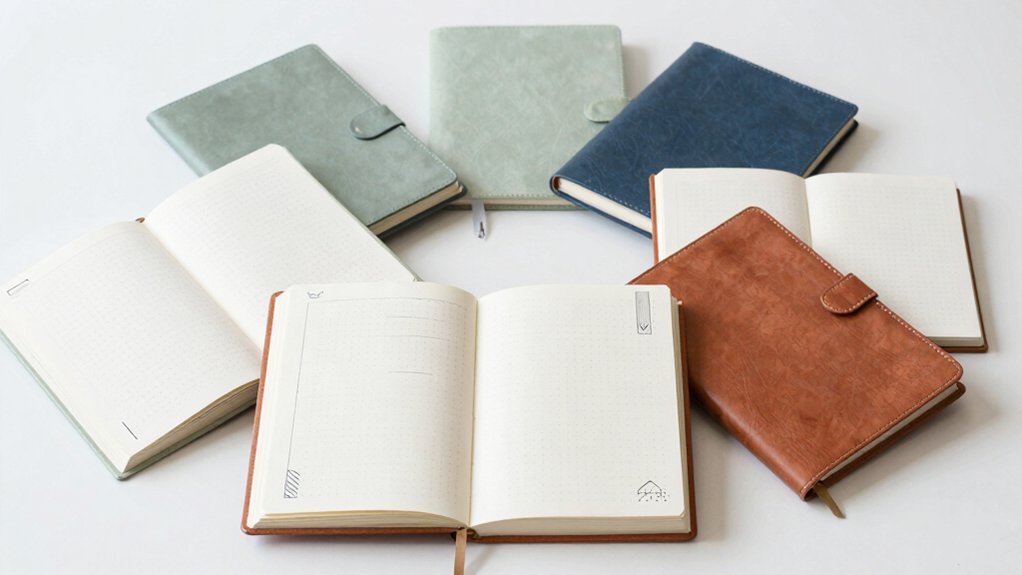
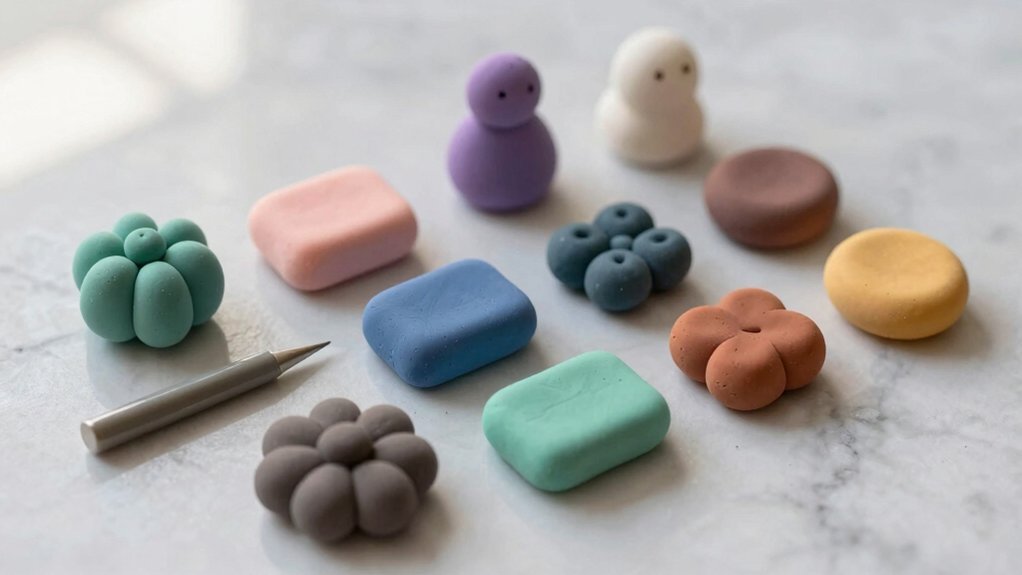
Leave a Reply